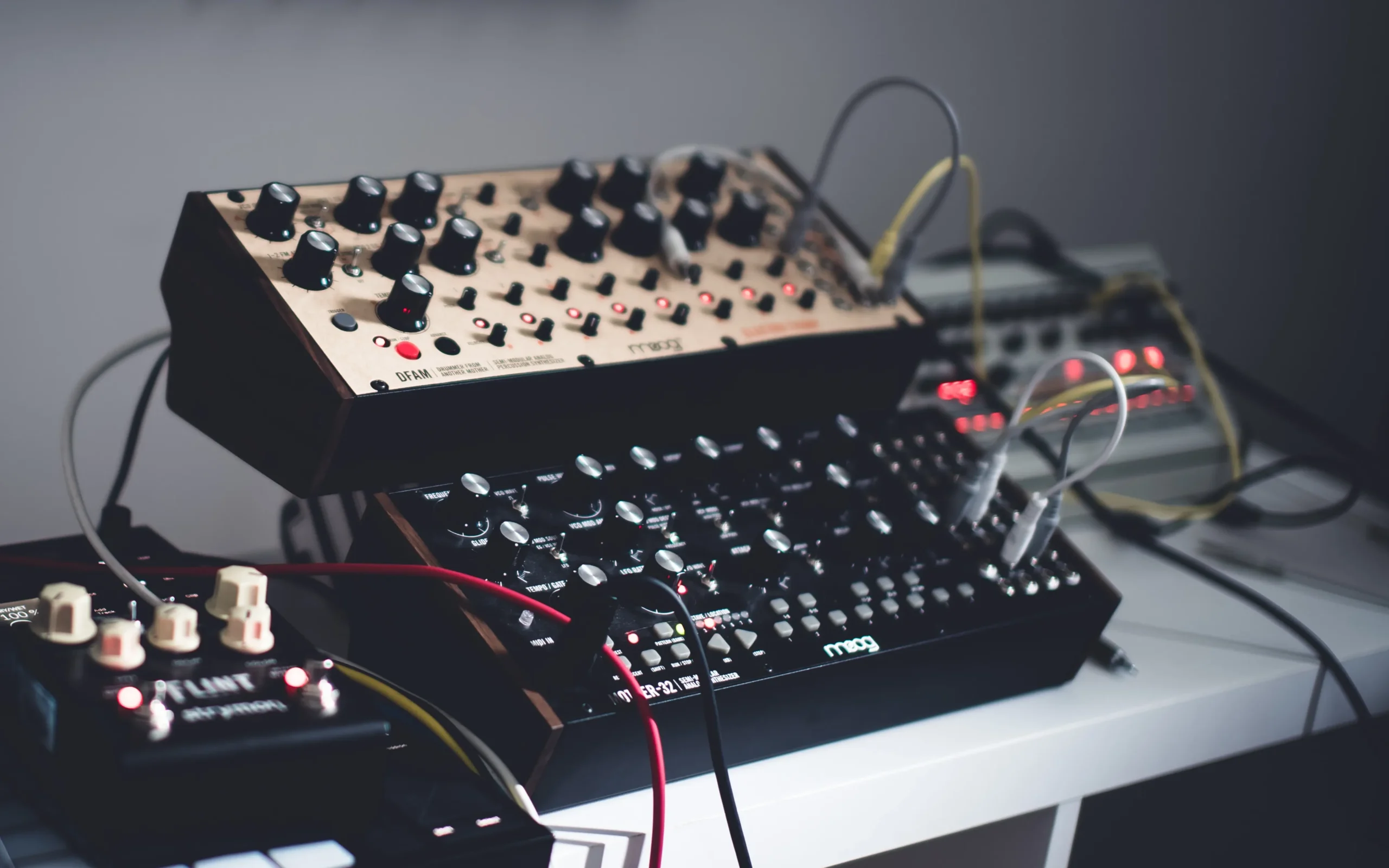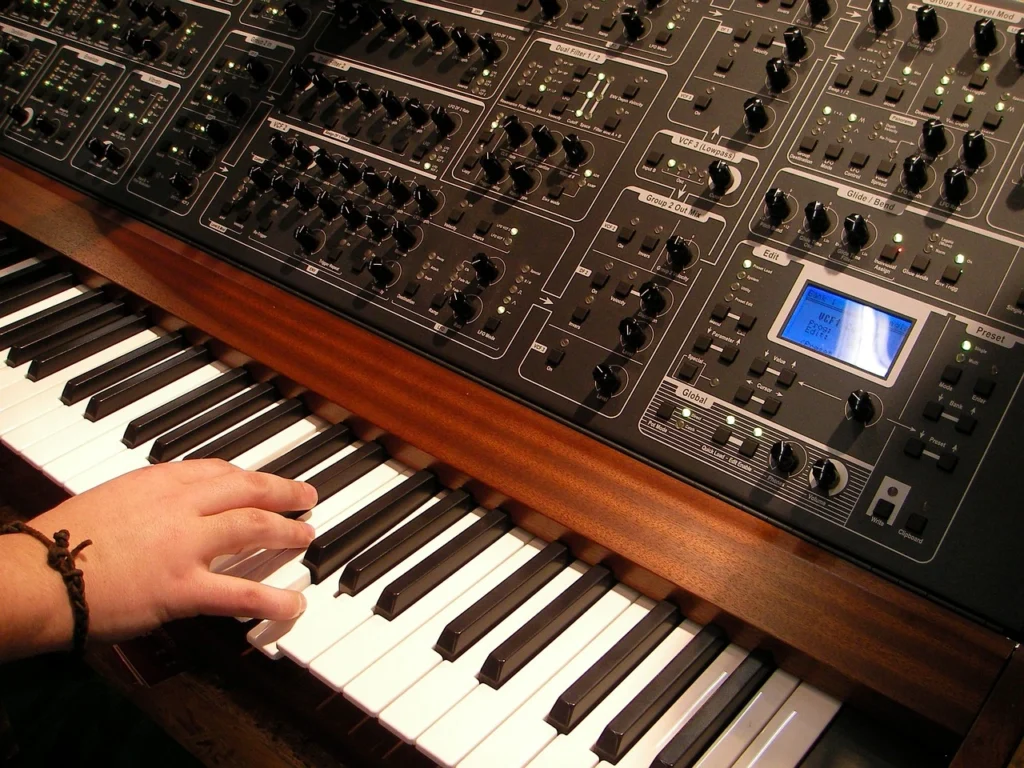
Table of Contents
What are the three types of synthesizers?
Learn about the many uses and applications of synthesizers in the music business. Synth have evolved into indispensable tools for musicians, producers, and artists, serving a variety of purposes from crafting distinctive sounds to augmenting live performances, sound design, and music creation. Discover the adaptability and suppleness of synthesizers with this educational piece.
Analog, digital, and hybrid synthesizers are the three primary categories of synth. Digital synth employ digital signal processing to create and alter sounds, whereas analog synth use analog electrical equipment to make sounds.
With the combination of analog and digital synthesis components, hybrid synth provide a range of conventional and contemporary sound creation options. Every kind has distinct qualities that appeal to certain producers and performers.

Synthesizers Uses
The music industry has been completely transformed by the powerful electronic musical instrument known as the synthesizer. To make a vast variety of sounds and music, musicians, producers, and composers frequently utilize it. We shall examine the numerous uses and applications of synth in this article.
1. Creating Sounds
Synthesizers are mostly used for producing distinctive and programmable sounds. With the use of synths, musicians may create a vast range of tones, from the sounds of classic instruments like pianos, guitars, and drums to sounds from the future and experimental genres. A variety of sounds that are not achievable with conventional acoustic instruments may be produced using synth with the use of oscillators, filters, and modulators.
2. Music Production
In the process of creating music, synthesizers are essential. They are employed in the production, arranging, and composition of music in a variety of genres, including as electronic, pop, rock, and film soundtracks. Producers may explore and push the limits of music creation with the freedom that synth give them to generate and modify sounds in real time.
3. Live Performances
Bands and musicians frequently employ synths during live performances. They give live performances more depth and richness by allowing artists to replicate studio-produced sounds on stage. Synthesizers are flexible instruments for live performances that may be performed using keyboards, MIDI controllers, or even software-based alternatives.
4. Sound Design
Synth are used by sound designers in video games, movies, and television to produce moods and sound effects. Sound designers may create a wide range of sounds with synth, from creepy ambient noises to realistic instrument sounds, and from spacecraft simulation to realistic instrument sound effects, to improve the audio experience in a variety of media.
5. Educational Tool
A useful tool for teaching and studying music is a synthesizer. They cover the fundamentals of sound synthesis, composition, and music theory in a practical way. Synthesizers are incorporated into the curricula of many educational institutions, including music schools, to enable students to experiment and play with various sounds and musical ideas.
6. Experimental Music
Instruments such as synth have been crucial to the evolution of avant-garde and experimental music. Synthesizers are used by composers and artists to explore new auditory realms with unusual and boundary-pushing sounds. Synthesizers are the perfect instrument for musicians who wish to push the boundaries of conventional musical traditions because of their adaptability and flexibility.
7. Recording Studios
All around the world, recording studios are equipped with synthesizers. They are often used to create layers, textures, and effects to music throughout the production and recording stages. Producers and engineers may mold and sculpt sounds to suit the intended tone of a song or album by integrating synthesizers into their studio setup.
8. Performance Art
In performance art, synth are frequently utilized to create interactive and immersive environments. Artists use a combination of synthesized music, movement, and graphics to enthrall and engage audiences. Synthesizers are an essential component of performance art installations and shows because of their real-time sound manipulation and control capabilities.
In summary, synthesizers are multipurpose tools with a broad variety of uses. Synths have evolved into indispensable tools for musicians, producers, and artists in a variety of fields. They may be used to create distinctive sounds and to improve live performances, sound design, and music production. In the always changing world of music and sound, their capacity to push limits and discover new aural possibilities makes them indispensable.
Check out this blog related to this blog
Check our featured blog
The Top Music Streaming Platforms: A Comprehensive Guide
Can AI Replace Human Musicians? Exploring the Future of Music Creation
Can AI replace human artists? Artificial intelligence in music Can AI Replace Human Musicians? Introduction Artificial intelligence in music (AI) is swiftly changing multiple industries, and the music sector is no different. The incorporation of AI into music production, songwriting, and live performance has opened the door to inventive practices and technologies that question conventional…
How to Use Vocal Compressor?
How to Use Vocal Compressor? Vocal compression is an important step in music production for creating a refined sound. This article covers everything from how to set up your compressor and dial in the optimum settings to advanced techniques like as parallel and side-chain compression. Learn how to control dynamic range, establish voice presence, and…
Difference Between Home Studio and Professional Studio
Difference Between Home Studio and Professional Studio Discover the fundamental distinctions between home and professional audio production facilities. Learn about each type of studio’s equipment, technology, and expenses, as well as the benefits and drawbacks. Whether you’re a hobbyist or a professional, this guide will help you select the best configuration for your requirements. Introduction…

Leave a Reply